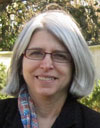|
Lectures |
| Week
1 |
Week
2 |
Week
3 |
Week
4 |
Week
5 |
Week
6 |
Week
7 |
Week
8 |
Week
9 |
Week
10 |
|
|
|
|
|
|
|
|
|
|
|
Thursday, January
18th
|

|
Bridging the Gap
between Consumers and Products in Rehabilitation Medicine
Deborah E. Kenney, MS, OTR/L
Stanford University, VA Palo Alto Health Care System, and
Foothill College |
Abstract: Occupational
therapists (OTs) are critical players in the transdisciplinary rehabilitation
team. An OT's job is to help people, who because of illness, injury, or aging,
have experienced a decrease in their ability to function independently in the
areas of daily living, work, play, and leisure. Treatment by an OT often
includes the prescription of assistive technology. This talk will focus on the
aspects necessary to effectively fit the technology to the individual and
support the use of this technology in the home environment, and the impediments
to providing this. She will be joined by a panel of stroke survivors: Albert A.
and Michael W. who will discuss their challenges and the assistive technology
devices they have used.
Biosketch: Deborah Kenney
has been an occupational therapist working with stroke survivors and hand
patients for the last 28 years. She currently splits her time, as a researcher,
between Stanford and the VA Palo Alto
Health Care System. She has collaborated on numerous design / development
research projects with both engineers as well as with graduate, medical, and
undergraduate students. Her work includes testing and integrating technology
into the rehabilitation setting with individuals with Parkinson's Disease, CVA
(stroke), spinal cord injury, hand and orthopedic surgery and rehabilitation,
and balance problems related to aging. Ms. Kenney currently works with
researching problems of hand rehabilitation and treatment related to post
surgical pain and thumb arthritis and continues to develop novel treatments for
post-stroke survivors privately in the community.
- Contact
information:
- Stanford Department of Orthopaedic
Surgery
- Hand Research
Coordinator
- 408/636-3124
- dkenney -at-
stanford.edu
- Lecture Material:
- Pre-lecture slides - 1.22 Mb pdf file
- Slides - 1.78 Mb pdf file
- Links:
- Dycem
- Kickstart
Exotendon
- The Design
and Evaluation of Assistive Technology Products and Devices
- Part 1:
Design
- Part 2: Evaluation
of Assistive Products
- Part 3: Outcomes
of Assistive Product Use
- Catalogs of
low tech devices for people with disabilities:
- Access Ingenuity
- Allegro Medical
- Be Adaptive - hunting, fishing,
archery
- EnableMart
- InfoGrip
- Move United -
adaptive sports equipment
- North Coast Medical
- Performance Health
- Sunrise Medical
- Therapro
- Where to donate used medical
equipment:
-
- Other Resources
- Developing medical device
technologies from users' perspectives
- Factors that predict the
post-discharge use of recommended assistive technology
- Christopher &
Dana Reeve Foundation
- What
are some types of rehabilitative technologies?
- RESNA
- Accessible
Technology Coalition
|